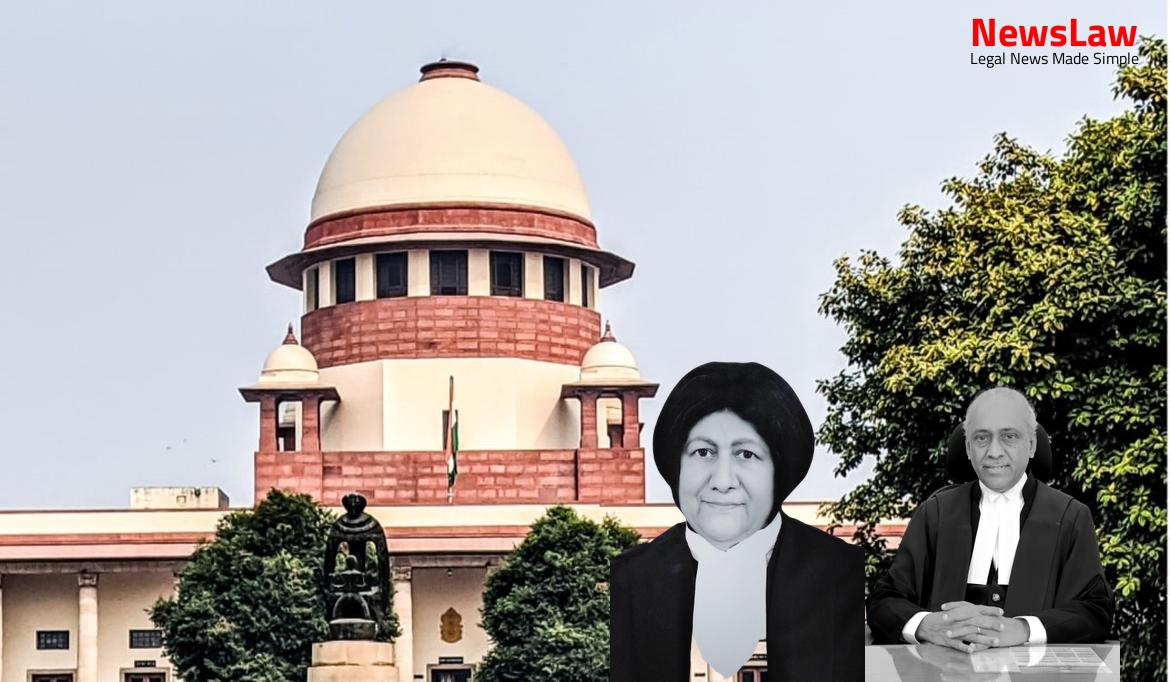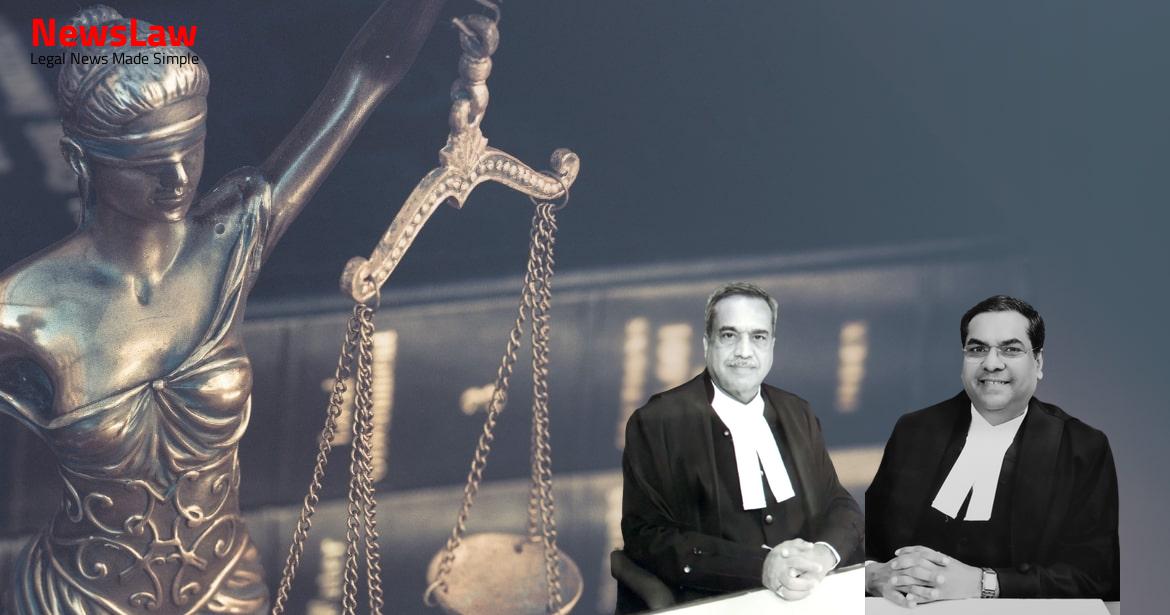In the realm of specific performance cases, the court’s scrutiny of a party’s readiness and willingness to fulfill contractual obligations is pivotal. This case delves into the in-depth legal analysis conducted by the court regarding the plaintiff’s demonstration of ability to pay the balance amount within the stipulated timeframe. The importance of providing concrete evidence of continual readiness and willingness as mandated by Section 16(c) of the Specific Relief Act, 1963, forms the crux of the court’s deliberation. Stay tuned to uncover the nuances of this essential legal aspect.
Facts
- The original Defendant denied the execution of any agreement for sale of the property for the alleged consideration of Rs.15,10,000.
- The original Defendant did not agree to sell the property to the Respondent Plaintiff as alleged and did not receive any advance on 11 November 2002 or any other date.
- All issues framed by the Trial Court were answered in favor of the Respondent Plaintiff.
- The appeal is against the High Court of Judicature at Madras’ decision to dismiss the Appeal Suit No 262 of 2011 filed by the Appellants and confirm the judgment and decree dated 30 November 2010 passed by the Trial Court.
- The Respondent Plaintiff filed for specific performance of the agreement for sale of the property in Original Suit No 30 of 2005.
- The suit property was bequeathed to the original Defendant by his father through a will dated 9 May 1984.
- The original Defendant became the absolute owner of the property after his father’s death on 25 April 1987.
- The alleged agreement for sale of the property took place on 11 November 2002 in the presence of a real estate agent and others.
- The terms and conditions of the agreement were recorded in a letter by the original Defendant and a sum of Rs.10,001 was paid by the Respondent Plaintiff as advance.
- Despite issuing a legal notice and multiple requests, the original Defendant denied entering into any oral sale agreement.
- The Respondent Plaintiff filed the suit after the original Defendant refused to receive the balance consideration and execute the sale deed.
- The parties had agreed that the sale deed would be registered by 15 March 2003 upon payment of the full consideration.
- The original Defendant continuously postponed the execution of the sale deed despite several requests from the Respondent Plaintiff.
- Trial Court’s judgment on November 30, 2010, decreed the suit in favor of the Plaintiff.
- Plaintiff was found to be ready and willing to perform their part of the contract.
- Plaintiff entitled to relief of specific performance as per Trial Court.
Also Read: Analysis of Financial Statements as Acknowledgment in Limitation Act Case
Issue
- The primary issue for determination is whether the Respondent Plaintiff proved his readiness and willingness to perform his part of the contract.
- Section 16 of the Specific Relief Act, 1963, prior to the 2018 amendment, requires a party seeking specific performance to prove their readiness and willingness.
- Section 16(c) of the Act bars the relief of specific performance if a party fails to demonstrate their readiness and willingness to fulfill their contractual obligations.
- The Trial Court framed several key issues, including whether the oral agreement of sale and the confirmation letter were true, and if the Plaintiff was ready and willing to perform the contract.
- The Plaintiff’s entitlement to specific performance and possession is also a pivotal aspect of the case.
- The Defendant’s argument that there was no concluded contract between the parties is also under scrutiny in this case.
Also Read: Interpretation of Corporate Guarantor under IBC
Arguments
- Mr. Venugopal argued that the Plaintiff had only paid a small amount of Rs.10,001/- as advance out of the total consideration of Rs.15,10,000/-, making it insignificant.
- He contended that due to the minimal advance payment, the Plaintiff was not entitled to discretionary equitable relief of Specific Performance, as per the precedent in Saradamani Kandappan v. S. Rajalakshmi.
- Mr. Venugopal highlighted the point that in a suit for Specific Performance, the Plaintiff must prove readiness and willingness to fulfill the contract obligations.
- He emphasized on the need for the Plaintiff to demonstrate ability to pay the balance money within the agreed time frame.
- Mr. Venugopal also urged the Court to consider the significant increase in real estate prices before granting specific performance relief.
- He claimed that both the Trial Court and High Court had erred in fact and law in their decisions.
- Mr. Venugopal argued that the Respondent Plaintiff had not provided sufficient evidence of continuous ‘readiness and willingness’ as required by Section 16(c) of the Specific Relief Act, 1963.
- He pointed out that the issues regarding ‘readiness and willingness’ had not been properly analyzed by the lower courts.
- The argument was made that the Respondent Plaintiff waited for almost 3 years before filing the suit for specific performance just before the limitation period expiry.
- The Plaintiff Respondent has to prove that they have the money or have made necessary arrangements to get the money.
- In the case of Bhavyanath v. K.V. Balan, the Plaintiff had presented strong evidence of readiness and willingness to fulfill the contract and showed they had sufficient funds available.
Also Read: Quashing of FIR and Charge-sheet: Legal Analysis
Analysis
- The Respondent Plaintiff failed to prove his readiness and willingness to perform his part of the contract by adducing sufficient evidence.
- The Plaintiff must plead and prove availability of funds to make timely payments as per the contract terms.
- Courts overlooked the vital issue of how the Plaintiff would arrange for balance funds within time.
- The balance sheet of the Plaintiff showed insufficient funds to fulfill the contract in March 2003.
- Mere assertion of readiness and willingness in the plaint is not enough; concrete evidence is required.
- Time element cannot be ignored in determining the Plaintiff’s readiness to perform.
- Depositing balance consideration seven years after the due date did not establish readiness to perform.
- For specific performance, the Plaintiff must prove continuous readiness and willingness to perform throughout the suit proceedings.
- Deposit of amount in court is not enough to establish the Plaintiff was ready and willing to perform his part of the contract.
- Continuous readiness and willingness from the date of the contract to the time of the hearing is essential for specific performance.
- A distinction exists between readiness and willingness to perform the contract, both of which are necessary for specific performance.
- Plaintiff must prove readiness and willingness to perform essential terms of the contract.
- Plaintiff’s conduct prior and subsequent to filing the suit for specific performance is considered to determine readiness and willingness.
- First Appellate Court should examine continuous readiness and willingness of the Plaintiff in a first appeal.
- Grant of specific performance is discretionary; plaintiff must allege readiness and willingness to perform.
- Delay in filing the suit after the breach/refusal may lead to greater scrutiny by the courts.
- Courts will apply strictness when considering purchaser’s readiness and willingness to perform the contract.
- Time limits stipulated in the agreement must be respected in suits for specific performance.
- The case of Bhavyanath v. K.V. Balan is not relevant to the current case.
- The Respondent Plaintiff was found not entitled to the relief of specific performance.
- Both the Trial Court and the High Court were deemed to have erred in granting such relief.
- There is a lack of evidence presented by the Respondent Plaintiff to show readiness or availability of sufficient funds to fulfill the contract.
Decision
- Appellants must return earnest money to the Respondent Plaintiff within 4 weeks with 7% interest per annum from deposit date.
- Respondent Plaintiff can withdraw deposit if balance consideration is not met in Court.
- High Court judgment and Trial court judgment and decree are set aside.
- Each party to bear their own costs.
- Appeal is allowed.
Case Title: U.N. KRISHNAMURTHY (SINCE DECEASED) THR. L.R.S Vs. A.M. KRISHNAMURTHY (2022 INSC 714)
Case Number: C.A. No.-004703-004703 / 2022



